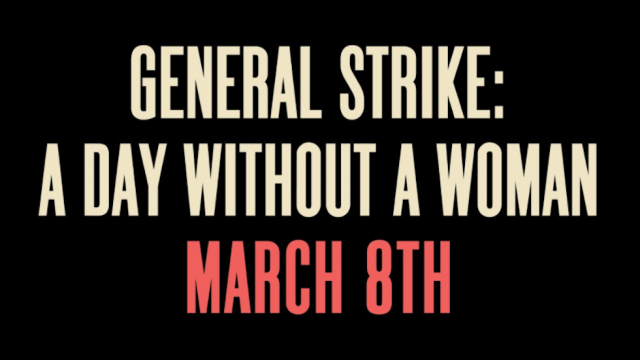It’s International Women’s Day! The Guardian is tracking live actions and protests as they happen around the world. Share what’s happening where you are with @Claire_Phipps.
In the U.S. context, the Women’s March called for A Day Without a Woman, while others have organized a similar Women’s Strike (that many people around the world are joining). The goal is for women to not engage in paid or unpaid labor (if they can), to not spend money (or only at women-only businesses) and to wear red. There are been many articles flying around about who has the privilege to participate or not, what the purpose of the strike is, and so forth.
Because there are many ways to join, I think it allows persons from a wide range of backgrounds to join in.
What I think is harder is to know what is the end game. If we literally were all walking off the job that would be more apparent. But is wearing red and not shopping for a day really going to have the same kind of impact? I know the point is to show women’s daily contributions but to what end? What would change?
I personally will still be working; as a consultant I don’t have vacation or sick days or personal leave, and, more importantly, since I work from home, my “absence” from work would be physically noticed by no one. But I will wear red and refrain from purchases. If the stakes were higher, if it seemed that my not working would result in concrete change, then yes, I’d force the issue with my employers, as surely would more women like me. But without a clear goal and set possible outcomes to our actions, it’s tough to want to “go all in,” so to speak.
I know that striking can work. We saw it work well in Iceland a few decades ago when women there went on strike (which is easier to do in a small country) and it’s worked in protests like the Montgomery bus boycott that was led and primarily carried out by Black women. There were clear cut goals to those strikes. That’s what I feel we are missing. What would we achieve if we really truly did all step away from our jobs, obligations and wallets?
Nonetheless, much solidarity to all who are joining and to all who will be advocating for women’s equality in whatever way(s) they can.
In the SSH context, for IWD you can advocate for women’s equality in public spaces by 1) planning to join International Anti-Street Harassment Week from April 2 to 8, 2) sharing your story for our blog, and/or 3) donating to help fund the National Street Harassment Hotline.

